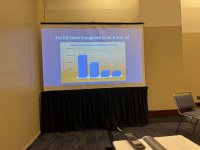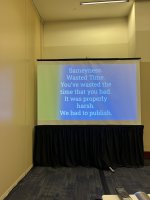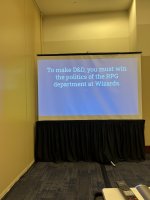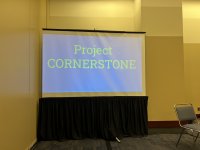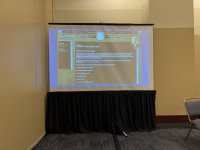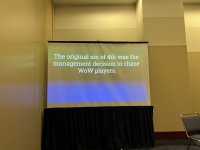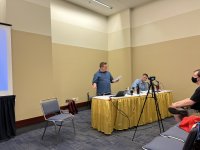Alzrius
The EN World kitten
I made sure to attend Ben Riggs' seminar about the rise and fall of D&D 4E while I was at Gen Con. While it's been nearly a week since then (the seminar having happened Thursday afternoon), my memory isn't quite so bad that I can't recall the bulk of the salient points discussed there.
Now, I've mentioned before that I don't care much for Riggs' writing style. While he does good work, and his current book is absolutely worth reading, he unnecessarily damages his own credibility by openly presenting his own biases and opinions with regards to the people he's writing about (in what I presume is an effort to sensationalize his writing, as opposed to presenting a "dry" history), rather than checking them to the best of his ability.
Having said that, in a more informal context (and with the added caveat that his research into 4E is still preliminary, something he highlighted multiple times in this seminar) he's a lot of fun to listen to, and the underlying data points are still very interesting on their own. To that end, what follows is a basic overview of what Riggs' presented.
Time will tell if he's right.
Now, I've mentioned before that I don't care much for Riggs' writing style. While he does good work, and his current book is absolutely worth reading, he unnecessarily damages his own credibility by openly presenting his own biases and opinions with regards to the people he's writing about (in what I presume is an effort to sensationalize his writing, as opposed to presenting a "dry" history), rather than checking them to the best of his ability.
Having said that, in a more informal context (and with the added caveat that his research into 4E is still preliminary, something he highlighted multiple times in this seminar) he's a lot of fun to listen to, and the underlying data points are still very interesting on their own. To that end, what follows is a basic overview of what Riggs' presented.
- According to a chart he put up, the AD&D 1st Edition Players Handbook sold 1.5 million copies. The AD&D 2nd Edition Player's Handbook (including the revised version, which he says sold almost nothing) sold 1 million copies. The D&D 3.0 Player's Handbook sold just shy of 370,000 copies, while the 3.5 PHB sold a little over 300,000 copies.
- Here, Riggs stressed that the 3.0 and 3.5 numbers were particularly unreliable, because they only covered January of 2001 through December of 2006. That left off not only the initial sales of 3.0 (which was released in the summer of 2000, and here Riggs noted that Ryan Dancey had told him that if that time period was included, it would have almost doubled the sales numbers for the 3.0 PHB) but also any lingering sales of the 3.5 PHB.
- So why were the numbers for 3.X so much lower than even 2E? According to him, the Hasbro execs were of the opinion that it was because World of Warcraft (which released in late 2004) was eating their lunch. They saw an explosive phenomenon, according to the people Riggs interviewed, that was essentially the same as D&D except in a computerized form, and wanted to get that crowd back to the tabletop. So they handed down a directive to start work on a new edition that would draw the WoW crowd to them (which, Riggs noted, was a major mistake).
- According to his sources, the early versions of 4E were wildly different from not only what we eventually saw, but anything that had come before. Things like your damage dealt depending on if you rolled an odd number or an even one, etc. A lot of these were rolled back later on, but one thing that stayed popular from the get-go was the idea of implementing "cooldown" periods for powers. This eventually became the AED part of the AEDU suites of abilities.
- Stephen Radney-McFarland was cited as a strong opponent of 4E's WoW-centric development early on. He raised a lot of flags which were ignored, and the one that was most heavily noted was the fact that a magic missile could potentially miss an enemy. According to Riggs, Radney-McFarland pointed to that as something their core audience would rally around as being emblematic of the changes that they hated.
- He also noted that Radney-McFarland ran a playtest for Jason Bulmahn, who was aghast at having magic missiles that could miss. "That was the moment Pathfinder was born," noted Riggs.
- Riggs also cited Gleemax as being a terrible idea that never lived up to its implementation (he also said that the infamous murder-suicide that happened on the Gleemax team had nothing to do with that). One of its biggest failings, according to him, was that it allowed players to pay for a single month's subscription, go in and download all of the 4E material that WotC had published to date, and then cancel their account, giving them legal ways to use 4E for just a small surcharge without ever buying a book.
- At that point, Riggs noted that the 4E PHB sold far less than the 3E PHBs.
- Riggs also spent a lot of time talking about how there was (and still is) a lot of internal politics that goes on with regard to WotC. He cites the company as having no single authority (where D&D is concerned), and that there are factions within the company that are engaged in power struggles to get their respective visions implemented (according to one of his sources, the word "Machiavellian" was used). The pro-OGL and anti-OGL factions are just two of them, and he compared and contrasted the disastrous 4E GSL to what happened this January with the OGL 1.1 fiasco.
- Another example that he uncovered with regard to internal politics was that, right before the 4E Monster Manual went to the printer, someone on the management team (he didn't say who) looked at the book, decided that the monsters' hit points were too low, and raised them all. There was no oversight, no review, no playtesting (in fact, the lack of any sort of organized playtesting for 4E among their fan-base was another point that was brought up), and the result was that a lot of fights against monsters early in 4E's life felt like a slog.
Time will tell if he's right.
Last edited:

